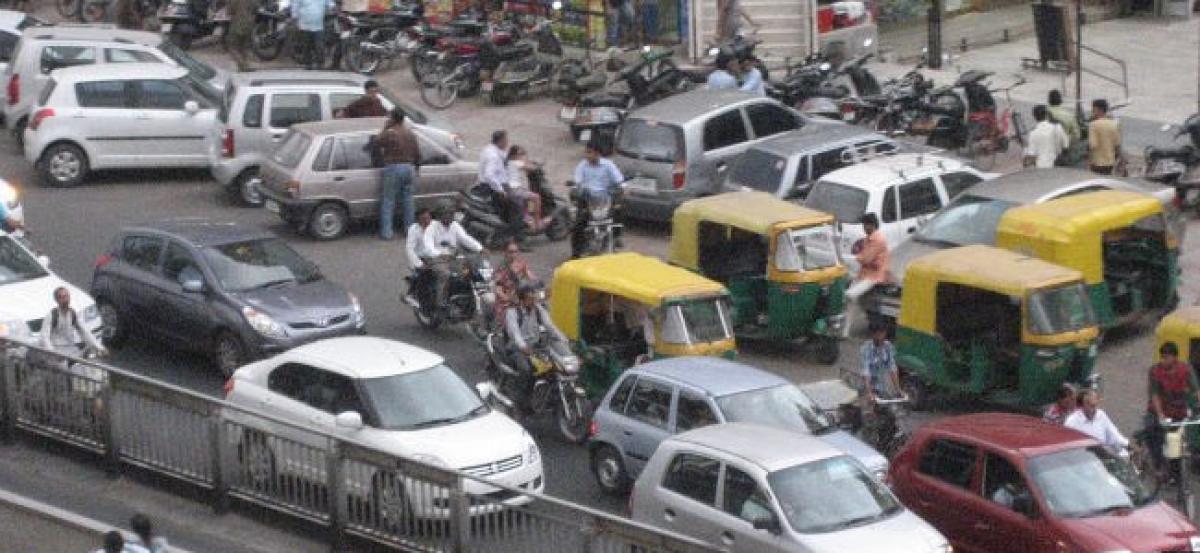Live
- Naxal menace has come to stay
- Preeti Tupsakhare Provides Expert Guidance on Integrating Genomic Data into Clinical Workflows, Bridging the Gap Between Genetics and Healthcare IT
- NLC INDIA Limited contributes Rs.1 crore to Kerala disaster mitigation fund
- World Children’s Day 2024: 20 November
- AR Rahman surprises fans with a divorce hashtag
- Keerthy Suresh to get engaged soon!
- CM A. Revanth Reddy Performs Special Rituals In Vemulawada
- Revanth Reddy Criticizes Bandi Sanjay and KCR Over Lack of Development in Karimnagar
- Major Scam Uncovered in Cyberabad; 3,600 Victims
- President Droupadi Murmu to Visit Telangana Tomorrow
Just In

The first monitoring and early warning system in India was launched on May 12 in Ahmedabad, with the hope that it will reduce the health impacts and deaths from air pollution, a growing problem in a country with nine of the world\'s 20 most polluted cities in 2016.
The first monitoring and early warning system in India was launched on May 12 in Ahmedabad, with the hope that it will reduce the health impacts and deaths from air pollution, a growing problem in a country with nine of the world's 20 most polluted cities in 2016.
Eight new air quality monitoring sites across Ahmedabad will produce a daily air quality index (AQI) that will be accessible to citizens through 11 LED screens, as part of what is called the Air Information and Response (AIR) plan.
An early warning system will notify people of excessive pollution days as part of the response plan, while medical professionals will be trained to respond to air-pollution emergencies in the city of over 5.5 million people. Ahmedabad was among the five most polluted cities in India in terms of PM 2.5, according to the WHO's 2014 Ambient Air Pollution database.
PM 2.5 is particulate matter finer than 2.5 micro-metres, or about 30 times finer than a human hair. Inhaled deep into the lungs, they can cause heart attacks, strokes, lung cancer and respiratory diseases, and are known to pose the greatest risk to human health. People living in more polluted areas die prematurely after long-term exposure to air pollution, and inconsistent monitoring makes it difficult to assess the threat posed by ambient air pollution.
The AIR plan is a collaborative effort between the Ahmedabad Municipal Corporation (AMC), Indian Institute of Public Health (IIPH), Natural Resources Defense Council, Indian Institute of Tropical Meteorology and the Indian Meteorological Department's System of Air Quality and Weather Forecasting And Research (SAFAR) network.
The monitoring and warning system will be tried for the first time in India, but follows the successful example of Beijing, that started the programme for issuing colour coded pollution alerts in 2013. The AMC has set aside a budget of Rs 30 lakh for 2017SAFAR has invested about Rs 20 crore to install 10 AQI monitors two in the adjoining city of Gandhinagar.
The AMC had drafted a comprehensive Air Action Plan to combat pollution from construction activities, vehicular emissions and industries in 2016, its second such plan since 2002, but it is yet to be implemented. "If people don't go to the highly polluted areas and follow the health advisory to minimise exposure, then symptoms will be reduced and there will also be a cost saving for citizens," Dileep Mavalankar, Director of IIPH said IndiaSpend.
"So, it depends on how effectively we are able to communicate to patients and the people who are vulnerable to avoid exposure." As part of the AIR plan, the AMC will issue a health alert when the AQI forecast for the next 24 hours is "very poor" (301-400). When the AQI forecast rises to "severe" levels (401-500), a health warning will be issued.
Under the health alert, the nodal officer of the AIR programme will "inform urban health centres as well as private medical practitioners including pulmonologists, paediatricians to alert them to expect and be prepared for more cases of respiratory health effects".
By Mukta Patil

© 2024 Hyderabad Media House Limited/The Hans India. All rights reserved. Powered by hocalwire.com







